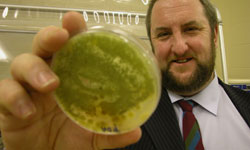
Professor Jamie Newbold and Dr Neil McEwan from the Institute of Rural Sciences at the University of Wales, Aberystwyth have, along with colleagues at the Institute of Grassland and Environmental Science, been awarded £189,360 to develop plant and herbal extracts for use in silage inoculants.
Prof Newbold said:
"Ensilage allows forages and crops produced during the growing season to be preserved for use as animal feeds during the winter or dry season. In the UK some 4 million cattle and 1 million horses require conserved feeds during at least part of the year. However, ensilage carries with it associated risks, specifically storage of crops in a moist form encourages microbial growth, and while well preserved silage will be free of pathogens poorly preserved silage will allow pathogens to survive with risks to both livestock and humans."
"There is an existing market for silage additives to improve both silage quality and consistency. This market is well established, UK sales are estimated at around £20 million per annum (£100-200 milion worldwide). We plan to expand this market by screening plant extracts, previously identified as having antimicrobial activity, for their ability to control pathogen growth in silage. These extracts will then be used to enhance existing silage additive formulations producing a new generation of products promoting safe nutritious animal feed with little risk of pathogen transfer either to humans or livestock," he added.
The 17 month project is funded by the National Assembly's Knowledge Exploitation Fund which in turn is funded under the European Union's Objective 1 programme. This funding is matched by additional contributions from a number of industrial partners, including Alzeim Ltd, Biotal Ltd, Compton Group, Neem Biotech Ltd, Dow Europe GmBH.
